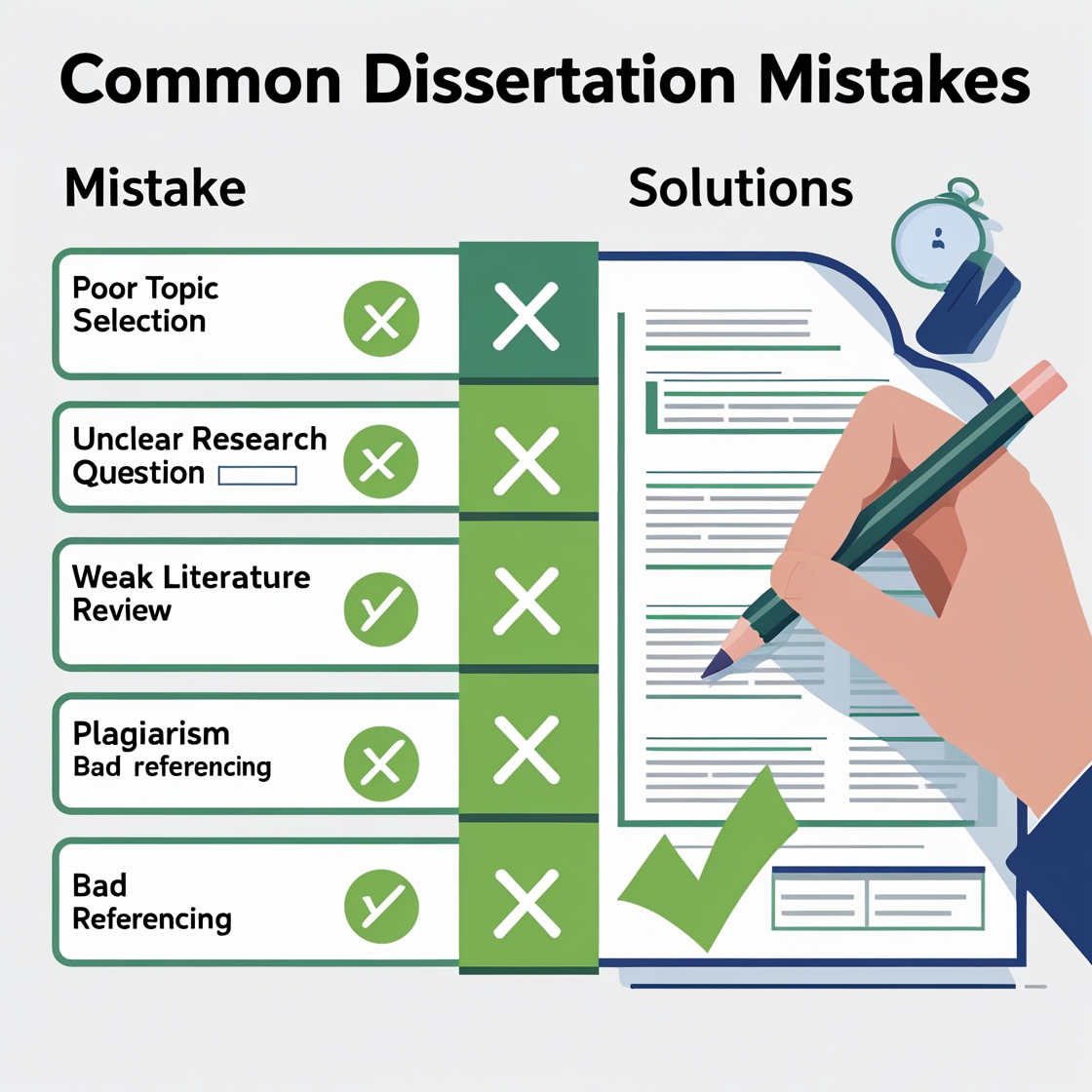2025-07-15

Writing a dissertation can be one of the hardest things a student has to do in school. In the UK, university students are often pushed to do high-quality research quickly. Sadly, a lot of students make mistakes that hurt their dissertation's ultimate grade. In this blog, we'll talk about the most common mistakes people make when writing their dissertations, why they happen, and how to avoid them.
This guide will help you stay clear of academic errors, manage your writing issues, and seek the right university help when needed, ensuring a smoother path to academic success.
Why Do UK Students Struggle with Dissertations?
1. Lack of Clear Planning
Many students begin their dissertation without a structured plan. This often leads to confusion, missed deadlines, and poorly organised content. A strong dissertation always starts with detailed planning great ideas can be lost if not executed properly.
2. Poor Time Management
Dissertations require consistent effort over several weeks or months. Unfortunately, some students delay their work and struggle to meet deadlines. Effective time management is essential for balancing research, writing, and editing tasks.
3. Not Understanding the Guidelines
Each university sets specific dissertation requirements. When students overlook these, they risk losing marks for formatting, referencing, or structure. It's important to fully understand your university's expectations from the start.
Most Frequent Dissertation Mistakes and How to Avoid Them

Choosing a Weak or Vague Topic
Your dissertation topic should be focused, relevant, and researchable. Students often choose topics that are too broad or lack academic significance.
Solution:
Pick a topic you are genuinely interested in, but also check if there's enough academic material available. Consult your supervisor to refine your idea into something manageable.
Failing to Develop a Strong Research Question
A weak research question might make your writing and research bad and confusing. It should be clear enough for critical scrutiny and guide your whole dissertation.
Solution:
Check your research question early on. Think about this: Is it possible to address this question in the word limit? Is it clear? Is it based on holes in existing research?
Ineffective Literature Review
Students sometimes omit the literature review or just give a list of summaries. This is a huge error.
Solution:
Your literature review should identify trends, gaps, and debates in your field. Use it to explain why your research is important. Don't just list sources; think about them critically.
Plagiarism and Poor Referencing
One of the most damaging academic errors is plagiarism, whether intentional or accidental. Many students also struggle with referencing styles like Harvard or APA.
Solution:
Use plagiarism checkers and always cite your sources properly. Keep track of your references as you research - it saves a lot of time later.
Weak Methodology Section
Some students don't make it clear how they did their research. Some people choose methods that don't fit with the question they're trying to answer.
Solution:
Your methodology should make it apparent how you did your research, how you gathered data, and how you analysed it. Make sure it makes sense and can be done again.
Poor Structure and Flow
A excellent dissertation should have a logical flow. It's easy to get confused when you jump from one point to another or mix together pieces.
Solution:
Use your university's dissertation structure as a template. Typically, it should include: introduction, literature review, methodology, results, discussion, conclusion, and references.
Not Addressing Counterarguments
Many dissertations only present one side of an argument. This weakens your critical thinking and analysis.
Solution:
Talk about the other side's point of view and explain why yours is stronger. This displays depth and maturity in your studies.
Overuse of Passive Voice and Jargon
You should sound formal when you write for school, but it doesn't mean you have to sound like a robot. Your work is hard to read if you use too much jargon or passive voice.
Solution:
Be clear. When you can, use active voice and stay away from long, complicated terms. Think about your audience; they should be able to readily follow what you're saying.
Ignoring Feedback
Students often receive comments from supervisors but fail to act on them effectively. This is one of the more avoidable writing issues.
Solution:
Treat feedback as valuable insight. Don't take it personally. Create a checklist of the feedback points and address them one by one.

What Can You Do Differently?
Start Early and Stick to a Schedule
Break your dissertation into smaller tasks and set deadlines for each. Use tools like Trello or Google Calendar to stay on track.
Use University Support Services
Many universities offer writing centres, academic tutors, and workshops. These university help services can assist with grammar, referencing, and research methods.
Keep a Dissertation Journal
Document your thoughts, challenges, and progress. This can help you reflect and stay motivated.
Final Checks Before Submission
Proofread Carefully
Never submit your dissertation without proofreading. Typos and grammar errors can lower your grade significantly.
Tip:
Read your work aloud or use software like Grammarly. If possible, get a friend or mentor to review it for you.
Double-Check Your References
Check that all of your citations are in the right format and that every source you identify is mentioned in the text. This makes your work look more professional and lowers the risk of plagiarism.
Backup Your Work
Use cloud storage like Google Drive or Dropbox to prevent data loss. Always save multiple copies, you don't want tech failure to ruin months of hard work
How Assignment Solutions Can Help
We know how hard it is for UK students to write their dissertations at www.assignmentssolutions.com . Our academic professionals are available to help you if you're having trouble picking a topic, writing, or polishing your material. With our expert help, you may avoid the most typical mistakes people make when writing a dissertation and turn in a well-researched, polished paper.
Conclusion
Writing a dissertation is no easy task, but with proper planning, support, and awareness of the common dissertation mistakes, you can navigate the process more confidently. Focus on avoiding academic errors, resolving writing issues, and taking advantage of university help resources. By doing so, you position yourself for academic success and a dissertation you can truly be proud of.
Frequently Asked Question
-
Choose a topic you're passionate about, but ensure it's narrow enough for focused research. Check with your supervisor and conduct a preliminary literature review to confirm its academic value.



Dissertation Writing Prices